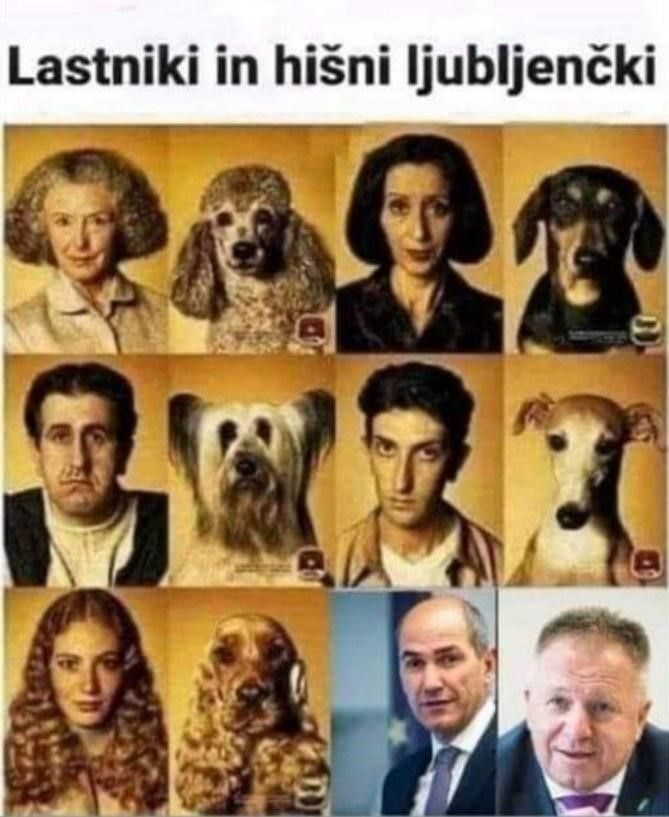What do we see?
This is a promotional photo for Cesar dog food, which appeared internationally in 2006 that echoed the widely held stereotype and assumptions about the similarity of pets to their owners. The photo became a meme (not only in Slovenia) in which the concept of dogs that look like their owners was extended to politicians and their relationship with well-behaved pets. The owner is the one who tells the pet what to do, while the well-behaved pet who is lower in the hierarchy, if it follows instructions well, will receive rewards.
What public issue is addressed here?
Janez Janša has been one of the faces constantly present in Slovenian politics since 1990 (though he had started his political career already in 1975). He changed his political affiliations several times and became very well-connected across the political spectrum. He is known for being politically right-wing since 1993, as well as for economic crime, bribery and behind-the-scenes manoeuvring. In 2020 he became Slovenian prime minister for the third time; he obtained this position after the collapse of the previous Slovenian government at the beginning of the Covid-19 crisis. Janša gathered a number of loyal colleagues around him, including the minister of economy Zdravko Počivalšek, with whom he ran several suspicious and often downright criminal operations concerning medical supplies during the Covid-19 crisis. Thus, it is due to his loyalty to Mr. Janša that Mr. Počivalšek is presented as his pet dog in the meme.
What does the humour do?
Internet memes present one of the very vivid genres in contemporary folklore. Most of the internet folklore and humour is topical, addressing current issues and events of either local or global interest (Laineste 2002; Blank 2013; Vargha 2018), and in the Slovenian context it is most often linked with political issues. This humour partly intertwines with the concept of newslore (Frank 2011) to describe “folklore [jokes, urban legends, digitally altered photographs etc.] that comments on, and is therefore indecipherable without knowledge of, current events” (Frank 2011: 7). Most Slovenian political humour in memes are either linked to well anchored stereotypes and parallelisms or parody and satire.
People often have a general tendency to perceive non-human beings as if they were human: this is also true of people who resemble their pets. Among dog owners, it is often assumed that one chooses a dog for its appearance, or that one’s appearance is adapted to that of the dog. This principle is also metaphorically applied to other animals (cat, snake, spider, bird, etc.) or to the human psyche, according to the principle “Show me your dog and I’ll tell you what you are like”.
The meme on owners and pets plays on the western-world stereotype of pet-owners’ physical resemblance to their pets and alludes to the ties between the psychological makeup of owners and their dogs. It concludes with a clear reference to loyalty in political crime: the visual resemblance between Janša and Počivalšek can be noticed only in the self-absorbed smiles of both. The meme is an obvious criticism of observing political loyalty only in order to get high rewards. The comparison of owners and pets with politicians, their connections and hierarchies, are sarcastic, i.e. the comparison is used to degrade, mock or convey contempt. This meme is the type of public humour which emphasizes the ridicule and deviation from social, moral, even legal norms.
Bibliography:
Blank, Trevor J. 2013. The Last Laugh: Folk Humor, Celebrity Culture, and Mass-Mediated Disasters in the Digital Age. Madison: University of Wisconsin Press.
Frank, Russell 2011. Newslore: Contemporary Folklore on the Internet. Jackson: University Press of Mississippi.
Laineste, Liisi 2002. Take It with a Grain of Salt: The Kernel of Truth in Topical Jokes. Folklore: Electronic Journal of Folklore, Vol. 21, pp. 7–25. http://dx.doi.org/10.7592/FEJF2002.21.jokes.
Vargha, Katalin. 2018. Creativity and Humor in the Online Folklore of the 2012 Elections in Hungary. Folklore 74. https://doi.org/10.7592/FEJF2018.74.vargha
